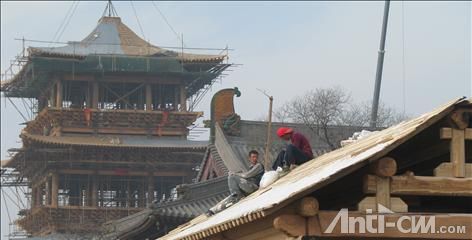|
|
本帖最后由 I'm_zhcn 于 2009-11-24 13:30 编辑
China hopes restorations spur domestic
http://www.usatoday.com/news/world/2009-11-23-china-building_N.htm
Updated 1h 43m ago By Calum MacLeod

Men work on the Huayan Buddhist Temple, one of several sites being restored in Datong, an industrial city known as China's coal capital. The citywide restoration project began this yea By Calum MacLeod, USA TODAY
In the recent past, China embarked on a construction spree with an architecture style that was anything but traditional. Its buildings imitated Rome, Paris and skyscraper cities such as Hong Kong. Last year, it wowed the world with the Bird's Nest stadium and other contemporary architecture for the Beijing Olympics.
Now, China is returning to its architectural roots and hopes to pump up domestic tourism.
"The government is investing more than ever before on restoring traditional cities," says Wei Xiaoan, one of China's leading tourism planners. "We Chinese used to look down on our own traditional things, but people's outlooks have broadened now, and we value tradition more."
As China's citizens hit the road to explore their own country, domestic tourism revenue jumped 12% in the first half of 2009, according to the national tourism bureau.
After decades of neglect or destruction, the current restoration effort reveals a new pride in China's historical past, says Wei, a researcher at the Chinese Tourism Academy and head of the China Alliance of Ancient Cities, Towns and Villages.
"In the 1980s, Chinese felt that tourism meant going to the USA or to big cities, to stare at tall buildings," he says.
Chi Shuli willingly tolerates the dozens of machines and hundreds of men working day and night outside his home to rebuild the massive city wall that once encircled Datong, an ancient border town in north China.
Datong — a grimy, industrial city known as China's coal capital — is undergoing a radical makeover to restore some of its grandeur from centuries past and dynasties long gone. The wall, its watchtowers and gates are rising again — not to repel invading armies as in yesteryear, but to lure an invasion of tourists.
The five-year project to restore Datong's historical appearance began this year with rebuilding the eastern section of the city wall — and the demolition of hundreds of homes.
"We needed to change," says Chi, who was laid off when the city's flour factory went bankrupt in 2003. "The project has brought a lot of inconvenience for residents, but it's worth it for future generations."
'I don't want to move out'
Some people in Datong are not happy with the makeover. Residents gather regularly outside the City Hall to press their complaints about compensation for losing their homes and about being relocated.
Jin Zhilan, 60, fears that next year, when streets in the city center are slated for restoration, she will have to leave the one-story home where she has lived for more than 20 years. It's near the Huayan Buddhist Temple, one of several temples going through a substantial expansion.
"It's a great plan, and I support it, but I don't want to move out, as life is convenient here," she says.
The rebuilding nationwide has also sparked some controversy. Officials at the state cultural heritage bureau complain that the rash of commercial "ancient streets" bear little resemblance to their historical counterparts.
"It's very difficult to restore buildings to the same state as they were before, as many original blueprints are missing," says Gu Jun, a building preservation expert at the Chinese Academy of Cultural Heritage, a government institute.
"We want more emphasis on preserving what is left, rather than rebuilding," Gu says.
Gu points to plans in Beijing to restore the Old Summer Palace, an imperial retreat destroyed by Anglo-French forces in 1860 in a shameful defeat for China.
"Many people have debated this recently, but I believe there is no need for full restoration," Gu says. "We should preserve it both for history's sake, and to remember, in its original condition, the humiliation of the Chinese people."
Great Wall under great threat
Last week, President Obama toured the Great Wall, yet even China's most famous tourist site faces a constant threat from developers and from decay, says William Lindesay, a Beijing-based author and photographer who runs the International Friends of the Great Wall, an advocacy group.
"I don't think China is active enough in policing and doing the emergency Band-Aid work to make the Ming dynasty Wall last longer," Lindesay says.
Datong's wall makeover "seems a pitiful and sad attempt to revise history," Lindesay adds. "Even if we rebuild these historical structures, they don't win the hearts of those who visit them. The real effort should be on preserving the original history that is still left."
The debate doesn't bother Chi in Datong as he watches workers lay down a wide street adjacent to the new wall where his neighbors once lived. Some of his neighbors had protested earlier this year, he says.
Next year, Chi will move and join them at Rome City apartments, one of several housing developments being built in the Datong suburbs. "I feel very proud," Chi says. "Our city used to be so beautiful, and now it will be beautiful again."

|
domestic, hopes, restorations, Spur, 美国, domestic, hopes, restorations, Spur, 美国, domestic, hopes, restorations, Spur, 美国
|